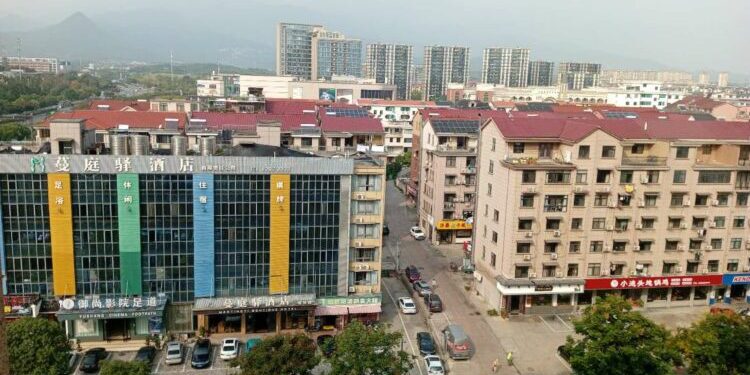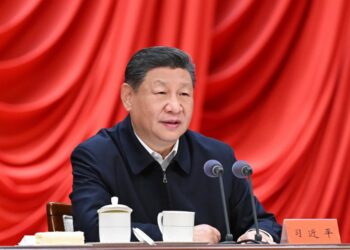Illustrative photo taken in the city of Jinhua (@Jérôme KABORE)
From November 7 to 9, 2024, the China-Africa economic, commercial and cultural forum was held in the friendly city of Jinhua, in Zhejiang province, under the theme “Exchanges and Mutual Learning: Link between Peoples and Win-Win Cooperation.” »This forum is co-organized by the Jinhua Municipal People’s Government and Zhejiang Normal University.
In this article, we zoom in on this province with invaluable cultural values, fully committed to promoting high-quality development, building a modern industrial system with provincial characteristics, and advancing the new path of modernization with Chinese characteristics. Fraternity and friendship with other peoples are the visible traits of the inhabitants of this province. Read
Located at the key intersection of the Belt and Road in the southern wing of China’s Yangtze River Delta, with an area of 105,700 square kilometers and a maritime area of 44,400 square kilometers, Zhejiang has jurisdiction over 11 cities district and 90 counties (cities, districts), and has been regarded as “city of fish and rice”. Zhejiang is the province of silk and tea, cities with rich cultural relics and an attractive tourist resort.
During the inspection of Zhejiang during the 19th Asian Games and the 4th Asian Paralympics held in Hangzhou in September last year, President Xi Jinping positioned Zhejiang as “the pioneer of modernization Chinese Characteristics” and proposed a new mission for the province, that is, striving to compose a new chapter of typically Chinese modernization.
Today, Zhejiang is committed to promoting high-quality development, building a modern industrial system with provincial characteristics, and advancing the new path of modernization with Chinese characteristics.
Zhejiang is a hot land for development. Sticking to high-quality development as the main task, Zhejiang vigorously launched the “No. 1 Development Project” to innovate and upgrade the digital economy.
The province has focused on building a world-leading manufacturing base, accelerated the construction of a scientific and technological innovation system, and made great efforts to foster advanced manufacturing clusters. Thanks to these efforts, the province continued to maintain good economic momentum. In 2023, Zhejiang’s GDP reached USD 1171.5 billion, ranking 4th among provinces (municipalities and autonomous regions directly under the central government).
The income of urban and rural residents has been first among provinces (regions) on the Chinese mainland for 23 and 39 consecutive years respectively. The value of key industries in the digital economy increased by $140 billion. In addition, Zhejiang has a number of leading companies in the digital economy, such as Alibaba, Hikvision and NetEase.
Zhejiang is a land rich in openness. Insisting on the “development of Zhejiang from Zhejiang”, the province adopted the “sweet potato economy” mode (that is, taking root in the local site and widely spreading the vines and leaves to outside to absorb nutrition) to upgrade the “Opening Project No. 1”. Zhejiang has continuously expanded its institutional opening-up and strived to build a world-class port and transportation power. Ywu-Xinjiang-Europe” connects China to European and Asian countries. Ningbo Zhoushan Port extends shipping routes in all directions around the world. Yiwu International Trade City buys and sells goods worldwide. The Global Digital Trade Expo and other major exhibitions provide valuable opportunities for businesses. In 2023, Zhejiang’s exports and imports reached $507.28 billion and $189.45 billion respectively, ranking second in the Chinese mainland in terms of exports, with a share of export of up to 15%, and actually used foreign investment of 20.23 billion dollars. In 2023, Ningbo Zhoushan Port recorded a cargo throughput of 1.32 billion tons, ranking first in the world for the 15th consecutive year, and a container throughput of 35.3 million TEUs, ranking ranked 3rd in the world.
Zhejiang is a fertile land for investment. Insisting on being a reform pioneer, Zhejiang launched the No. 1 reform project to optimize and improve the business environment and strive to build a world-class market-oriented business environment governed by a framework solid legality. Zhejiang has been rated as the province with the best business environment reputation by the China Federation of Industry and Commerce for four consecutive years. The number of market operators in the province reached 10.4 million, with an average of one boss per 6.5 residents and one business per 20 residents in Zhejiang. 108 companies were listed in the top 500 private companies in China in 2023, ranking 1st in mainland China for the 25th consecutive year. The province is home to 42,000 high-tech companies and 115,000 technology-focused SMEs.
Zhejiang is a blessed land to live in, with a splendid culture. The archaeological ruins of Liangzhu City demonstrate that China has a 5,000-year-old civilization. The capital site of the Southern Song Dynasty proves the 1,000-year history of Song culture. Hangzhou West Lake, Jianglang Mountain and the Grand Canal of China have been included in the “World Heritage List”. Zhejiang has picturesque landscapes and is the birthplace of President Xi Jinping’s concept that “Green mountains and crystal clear water are valuable assets.” With a forest coverage of 61.36%, ranking 3rd in mainland China, Zhejiang became China’s top ecological province in 2019. Known for its magnificent scenery and bustling vitality, Zhejiang attracts hordes of tourists from all over the world thanks to its unique charm.
As a reminder, Zhejiang is an eastern coastal province of China. Its capital and largest city is Hangzhou, other important cities in the province include Jinhua, Ningbo and Wenzhou. Zhejiang is bordered to the north by Jiangsu and Shanghai, to the northwest by Anhui, to the west by Jiangxi and to the south by Fujian. To the east is the East China Sea, beyond which lie the Ryūkyū Islands. Zhejiang’s population is 64.6 million, making it the eighth most populous province in China. It is nicknamed “the backbone of China” because it is an important engine of the Chinese economy and is the birthplace of several famous people, including Chinese nationalist leader Chiang Kai-shek and the entrepreneur Jack Ma. Zhejiang is made up of 90 counties.
NB: the original version of the source is in English








